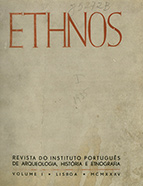

................................
With regard to the first point, the "need to bring together the friends of the Museu Etnológico , so unjustly attacked" by the Associação dos Arqueólogos do Carmo [Association of Carmo Archaeologists], led by Mendes Correia, was another justification presented by the future director of the Faculdade de Letras of Lisbon. According to Carlos Valentim (Heleno [Júnior], Manuel Domingues, Dicionário dos Historiadores Portugueses [Dictionary of Portuguese Historians]), this association represented, on one hand, the establishment of a school of archaeological thought opposing the idea of negroid and Australoid affinities with the people of the Muge councils. This stood in contrast to Mendes Correia’s position, which emphasised the influence of African elements in the formation of Portuguese nationality. On the other hand, it reflected the personal ambitions of Manuel Heleno, who, being closely aligned with Leite de Vasconcelos, succeeded him as director of the Museu Etnológico . Heleno assumed wide-ranging authority to authorise and conduct archaeological surveys and research expeditions. This concentration of power may have limited archaeological initiatives from sectors of the discipline that diverged from Heleno’s vision. Nevertheless, Heleno consistently invoked "the defence of the nation's archaeological heritage," a concept he elaborated on in an article published in the 1965 edition of Ethnos. The IAHE and the journal Ethnos , both established at the height of these controversies, served as the scientific platforms for the Museu Etnológico group led by Heleno and guided by the scholarly teachings of Leite de Vasconcelos.
In terms of internal organisation, Ethnos adhered to Decree no. 22.338 (issued under Gustavo Cordeiro Ramos, Minister of Public Instruction), which structured its board of directors to mirror the decision-making framework of the Instituto de História, Arqueologia e Etnografia . The administrative hierarchy included roles such as president, vice presidents, first secretary and curator of collections, second secretary, member responsible for publications, treasurer, and two additional members. The inaugural issue of Ethnos opened with José Leite de Vasconcelos (João Paulo Silvestre, Vasconcelos [Pereira de Melo], José Leite de, Dicionário dos Historiadores Portugueses ) as president. Vice-presidents included Manuel Heleno Júnior and João Silva Marques (compiler of Descobrimentos Portugueses [Portuguese Discoveries]), with Orlando Ribeiro (a prominent figure in Portuguese geography) serving as second secretary. José Augusto Frazão de Vasconcelos (a historian of notable standing during the Estado Novo ) was named the member responsible for publications. This leadership structure placed some of the most influential figures in Portuguese academia from the first three-quarters of the 20th century at the helm. Orlando Ribeiro maintained his position until 1942, stepping down thereafter, possibly due to a dispute over the legacy of José Leite de Vasconcelos, with whom both Ribeiro and Manuel Heleno considered themselves devoted disciples (Carlos Manuel Valentim, Idem). Meanwhile, Frazão de Vasconcelos held his post until 1965, later serving as a general member in the 1966 and 1969 editions, before his death in 1969. In 1942, following the death of Leite de Vasconcelos, the presidency remained vacant until Manuel Heleno assumed the role in 1948, retaining it until his death in 1970. Subsequently, in 1979, Justino Mendes de Almeida—a historian, archaeologist, vice president of the Academia Portuguesa da História [Portuguese Academy of History], and former president of the Junta de Investigações do Ultramar [Overseas Research Board]—was appointed as director.
This work is financed by national funds through FCT - Foundation for Science and Technology, I.P, in the scope of the projects UIDB/04311/2020 and UIDP/04311/2020.
